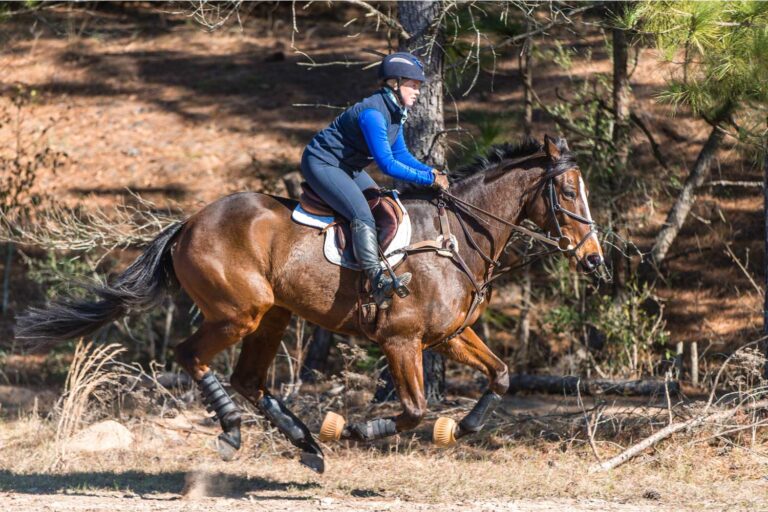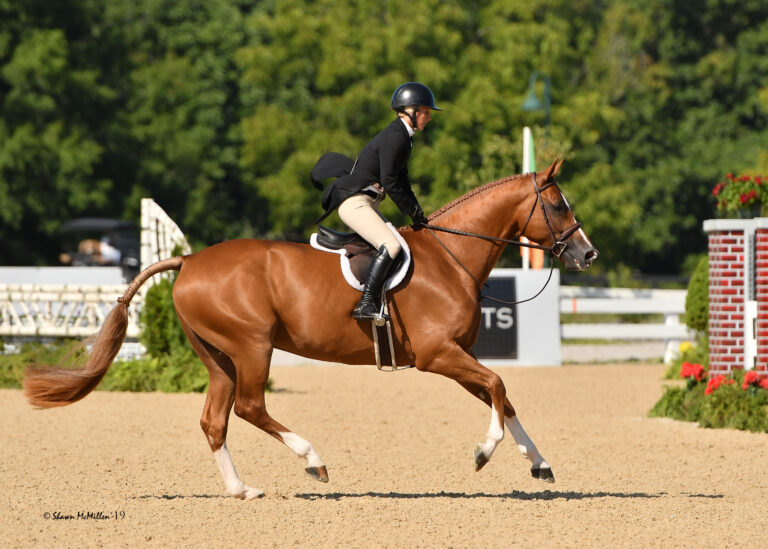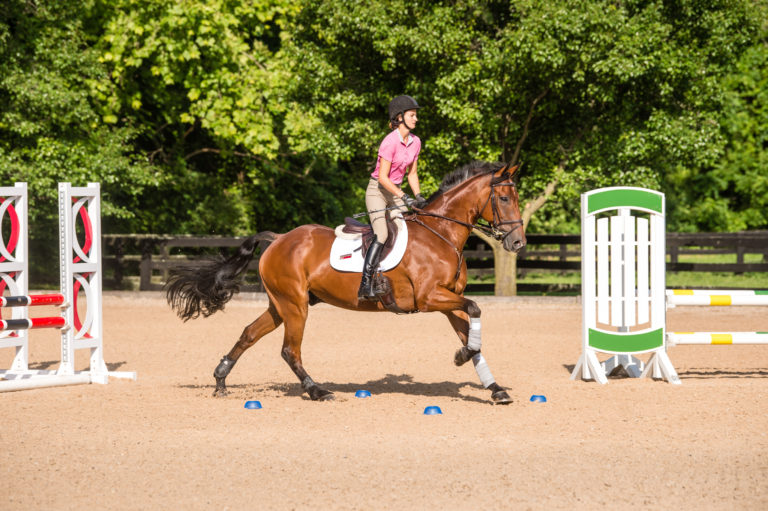For most hunter riders, winning the AHJF Hunter Classic once is a lifetime dream. Liza Towell Boyd has won it twice, and in a way that made the victories “very special” for her. In 1997 (the Classic’s inaugural year), her father Jack Towell laid the groundwork for her as a Junior to win on her hunter Monday Morning. In 2008, it was her younger brother Hardin Towell?only recently out of the Juniors himself?who was “eyes on the ground” for Liza Boyd, now riding Fiyero as a professional.

Just as this history illustrates how the Towell family team from Finally Farm has grown and strengthened, Liza Boyd also found the two classics differed in an important way: her own involvement in the process. Her Junior Hunter Monday Morning, an off-the-track Thoroughbred, was “a little bit of a tricky horse who would only do one lead change,” so he was routinely prepared at home and at the shows by Jack Towell. “Then I just got on and rode him?I was the jockey!” Liza Boyd says. By 2008, after more than a decade of learning to adapt to all types of horses in the family business, she was “much more hands-on in the care and training of the horse” and much more responsible for Fiyero’s achievement. Ultimately, however, the result was still all about a family effort that started before Liza Towell Boyd was born almost 30 years ago.
Growing Up With the Best
Liza’s mom, Lisa, rode in the Amateur divisions for a while after she and Jack started their Finally Farm business (originally in North Carolina), and she was the parent most often helping Liza on the flat during her earliest riding years. “I loved my little white ponies,” Liza recalls. “I loved brushing them and hopping on bareback and riding with friends.” Jack coached her over fences, where she had a natural eye for “finding the jumps.” However, the technicalities of riding demanded more work. “The correct position, the strength for holding a two-point and?especially?getting the correct diagonal, all that was really tough for me.” Liza remembers days of practicing on the longe with Lisa giving instruction and encouragement. “But it was something I always wanted to do.” By age 3 she was showing on a small pony named Cash and Carry.
She affectionately recalls Hardin having a more ambivalent attitude about riding as a youngster. “He liked to ride when there was an audience, but he didn’t like to practice at home. He had some really bratty ponies, and I remember once when he fell off and looked at my dad and said, ?I’m taking up a different sport!'” The middle Towell sibling, Ned, showed in the Short Stirrup and Junior divisions until his main focus became foxhunting. “That was his world,” Liza says. “He was very social and went to all the hunt balls.” Ned has put even hunting aside in recent years for a business career and involvement in local politics, but Liza is sure he’ll be back on a horse when time permits.
The young Towells’ access to training from other professionals was a plus whose importance Liza recognized only later. “I look back now and think, ?You didn’t realize how lucky you were!'” A great friend of the family was the late legendary trainer and judge Ronnie Mutch. One of Jack Towell’s early mentors, Ronnie also trained Liza and Hardin. Now that she is teaching and giving clinics herself, Liza says she finds she uses teaching techniques that she ?absorbed from Ronnie.
Other key influences included top equitation and jumper trainer Missy Clark, who coached both Liza and Hardin in their Junior equitation days, and the late hunter judge and trainer Roger Young, who lived across the street from the Towells’ Finally Farm. “We would go over there after school, and I remember Roger watching me ride and giving me tips.”
At horse shows, Liza had the chance to watch the best riders in the hunter/jumper world. “For me, it was people like Elizabeth Solter. I remember thinking how great she was, such a diverse rider who could ride a hunter round beautifully and then go win the grand prix at Harrisburg. Also Nicole Shahinian-Simpson?she was a little older than me, but when I started doing Junior Hunters she was winning everything and I thought she was terrific. She rode in such beautiful style, so slender and tall and always in perfect position.”
“Just Another Girl”?NOT!
Top coaching plus Liza’s own work ethic added up to a brilliant Junior career whose many high points ?included winning the National Pony Finals on her large pony Tickled Pink, coming second in the Washington International Horse Show Equitation Classic on Brother and winning the Junior Jumper Championship at Washington on Naturally, a sister of famous grand prix jumper The Natural. In her final Junior year Liza also won the Junior Hunter Championship at Madison Square Garden on Juliet, a “very special” hot chestnut mare who continued to win championships with Liza in her first year in the professional divisions.
Then, with the Juniors behind her, Liza had a go at a conventional non-horse-show lifestyle when she enrolled at the College of Charleston about three hours’ drive from the Towells’ farm in Camden, South Carolina. “I wanted to totally do the college thing. I didn’t take a horse to school with me. I joined a sorority and didn’t ride on any college team. At the beginning, none of my college friends knew anything about my riding life?I was just another girl there.”
But not for long. She says, “I couldn’t keep it up. Even though I told myself I wouldn’t, I couldn’t stay away from the horses. Saturday afternoon would come and when everyone else was relaxing I would be saying, ?I need to go and ride.'” Some good friends of the Towells’ had a farm not far from the college. “I went out there on the weekends to teach lessons and ride.” She also went home occasionally to show. With Naturally, she eventually competed in her first grand prix classes. “She was a steppingstone into the jumper ring for me. That was fun?I thought, ?Hey! I can do this!'”
“You’re Always ?Working on Yourself”
After graduating with a degree in psychology, Liza spent a couple of years working for different barns?Scott Kemery in New York, Sandy Lobel in New Jersey, and Tom Wright in Ohio. “I needed to do that before I jumped back into the family business. You see a lot of different training and business approaches, you learn a lot?then you can mold all that input into whatever works for you.”
As her professional career evolved, she continued to love the type of ride that was familiar from years of helping to improve difficult ponies and horses?often hot and opinionated, but usually forward as well. “I’d rather have a horse that’s going to take me a little than one that’s way slow.” At the same time, she learned to adapt to the quieter warmbloods that were supplanting Thoroughbreds in many divisions. The challenge with every horse, she says, is “figuring out the exact kind of ride you need to get that perfect jump. You’re always working on yourself, because the horse is not going to change. You can work on their weaknesses but at the end of the day, I think you need to go into the ring and sort of adapt to them.”
The business at Finally Farm works somewhat the same way in that family members adapt to each others’ strengths and gravitate to the areas at which they’re best. “We try to help each other out in that way,” explains Liza. “Hardin has a mare that’s a little hot and he said to me, ?Would you flat her for me before the grand prix? She always goes better after you flat her.’ He is bigger and stronger than I am and has these long legs he can really wrap around a horse, so if one of mine is getting really strong with me, I may say, ?Would you get on this one? I can’t get to the bottom of him!’ My dad is great as a groundperson but he can also flat a horse better than anyone I know, and has great natural feel. If one of us is struggling with a flatwork issue, we ask him to get on while we watch. Just by watching him work my horse, I realize what I wasn’t doing right?even though words couldn’t explain it.'”
The “backbone” of the operation, she says, is her mother, Lisa, who manages the office work and is considered to have the best eye for a horse in the whole family. She also is a consistent, informed source of comment on training and showing from her vantage point at the kitchen window or in the spectator stands. “She’ll call me on my cell and say something like, ?I think that student’s stirrups need to come down a hole,” and I’ll usually say, ?You’re so right! How did I not see that?'”
Hardin, now attending Florida Atlantic University and commuting to the shows when the barn is not showing in Florida, has gravitated to the jumpers as a professional. “If it comes down to a decision on who shows what, I would show the hunter and he would show the jumper,” Liza says. “But we can cross over and do both.” Hardin has done well with Rockefeller, a grand-prix horse that Liza brought along as a 5-year-old. “I’m a really good owner!” Liza laughs. “When he wins on that horse I get just as excited as if I had been riding it.” Meanwhile, she won the 2007 Indoor circuit “triple crown” of Regular Working Hunter championships on Brunello, a warmblood-cross originally destined to be Hardin’s ride when he was purchased in Europe.
High on her current list of showing excitement is the ?recently introduced Hunter Derby format. She won two of these classes in 2008 on Castello, imported as a jumper for his owner Roger Smith. “Castello jumps in such good style that we turned him into a hunter. His owner rides him in the Amateur-Owner division and he’s really nice in the Derbies. He turns well and isn’t spooky. I tell Hardin that the Derbies?where the second, ?handy’ round is like a jumpoff?are the hunter equivalent of grand prix.”
Something New Every Day
The family business at Finally Farm ?acquired a new dimension with Liza’s December 2006 marriage to Blake Boyd, whose mother, Lee Boyd, was a college friend of Lisa Towell’s. “The ?family had ended up buying a farm here in Camden and when my mom saw Blake for the first time, she came home and said, ?I’ve found you the cutest guy!’ and I thought, ?This is crazy,'” Liza remembers. She stopped laughing once Lisa had invited Blake’s entire family over for dinner and Blake and Liza hit it off and began dating.
Blake, an equine and farm insurance agent for EMO who also does business in real estate, grew up around horses and has his own horse transportation company. As soon as Jack Towell noticed how well Blake handled a truck and horse trailer, Liza says, “It was ?Oh! You can drive us to the horse shows!'” Blake now typically ships the farm’s horses to the show, helps the family unpack, then returns home for a few days before returning for the weekend classes. “It’s a good balance. We’re able to see each other, and he’s actually working at the show himself, not just hanging out. He has great horse sense and is good at handling them. He’s involved, but can also leave for a while to do his own thing,” Liza says.
Turning 30 this year and with more than two decades of major Junior and professional titles to her credit, Liza continues to have a fresh sense of excitement about every day in the horse business that has little to do with competition itself. “The horses teach you something new every day, and that’s what’s really fun. My dad has done this forever, and I don’t think there’s ever a day when he’s bored. He’s so open-minded, always trying new things. That keeps you really motivated?you’re always wanting to get better. Of course everyone wants to win blue ribbons but you also like to bring along a young horse, sell it and see it go really well for the new owner. There are always so many things to be excited about.”
This article originally appeared in the February 2009 issue of Practical Horseman magazine. Read more from Liza in the January 2011 issue.










